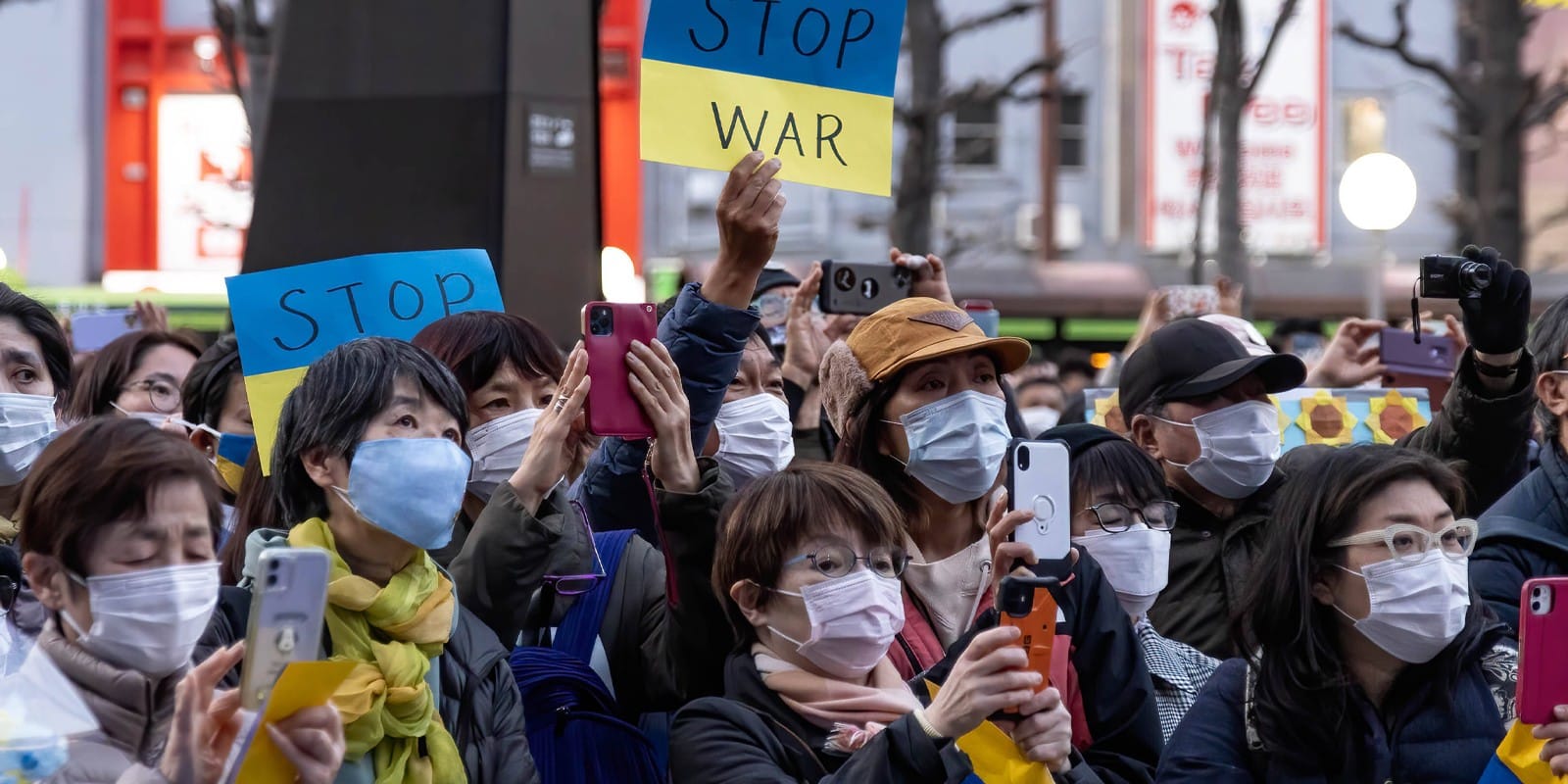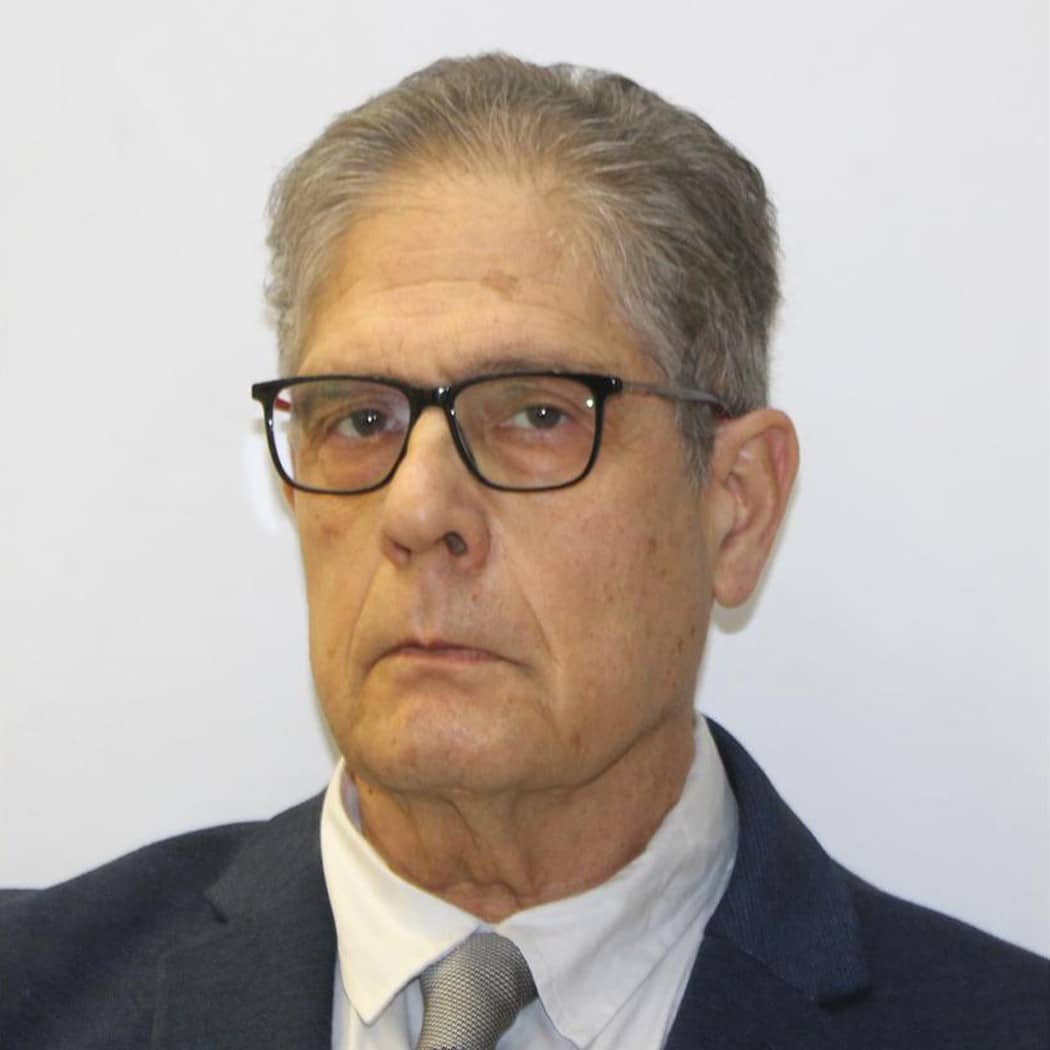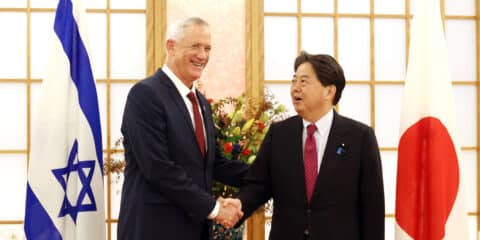Two weeks after the war began, Japan announced that its new National Security Strategy scheduled to be published this year would recategorize Russia from “partner” to “security challenge,” thus placing it alongside China and North Korea.
Considerable attention to the global impact of the war in Ukraine has been devoted to Europe and the United States. However, the war has already impacted Asian countries, especially Japan, where Russia’s invasion has led to a significant change in the country’s foreign and security policies.
In the wake of the war, Japan’s leaders have clearly condemned Russia’s actions and placed the country squarely behind NATO and the European Union, and have also promoted this line among the country’s Asian neighbors. However, most Asian countries, apart from South Korea, Singapore, Australia, and Taiwan, have adopted a much more cautious line.
Diplomacy has been accompanied by concrete measures such as placing sanctions on Russia and many of its leading companies and prominent individuals or sending security-related but non-lethal aid to Ukraine. Japan’s strong reaction hence continues the emergence of a much more proactive foreign and security stance than in the past.
Japan’s actions should be understood in terms of two concerns. First is its territorial dispute with Russia, which still occupies an island chain occupied by the Soviet Union after World War II. Second is its concern about China’s aggressive actions over the past two decades and its potential for attacking the Senkaku Islands or Taiwan.
The consensus among Japan’s decision-makers is that the range and intensity of Russia’s aggression differs greatly from its occupation of Crimea in 2014. Japan has reacted in several ways. First, all the country’s senior leaders, spearheaded by Prime Minister Fumio Kishida, Foreign Minister Yoshimasa Hayashi, and Defense Minister Nobuo Kishi, have explicitly supported Ukraine and pressed Russia to stop the hostilities and withdraw from seized territories.
Moreover, Kishida has plainly linked the conflict to the possibility of China taking Taiwan by armed force and changing the status quo in the Asian region. Public opinion polls show support for this new assertive approach is high, as is the popularity of the Kishida government’s actions.
In addition to condemnation, Japan has imposed sanctions like those imposed by the US, the G-7, and European countries. This stands in contrast to the tepid restrictions imposed during Russia’s invasion of Crimea in 2014. Measures include restrictions on Russia’s central bank, encouraging Moscow’s removal from the SWIFT banking system, freezing the assets of senior Russian (and Belarussian) officials and oligarchs, removing Russia from its most-favored-nation status, banning exports of Russia-bound oil refinery equipment, ending the issuing of Russian bonds in Japan, limiting travel to Japan, and imposing export controls on goods such as semiconductors.
In addition, Japan decided to offer $200 million in humanitarian assistance and loans to Ukraine. A week into the conflict, Japan also decided to send medical equipment, flak jackets, helmets, winter clothing, and food supplies. The gear was first transported using US Air Force planes and later via official Japanese Self-Defense Force planes landing in Poland. Next, despite strict limitations on granting refugee status to individuals, Japan decided to award over four hundred three-month visas to Ukrainians who have family or friends in Japan. In addition, many leading Japanese companies such as Toyota, Nissan, Sony, and Nintendo have stopped exports to or production in Russia.
One immediate concern for Japan will be its energy security. While only four percent of Japan’s crude oil and nine percent of its liquified natural gas are supplied by Russia, this is a worry given Japan’s lack of domestic energy supplies. Some Japanese companies have stakes in oil projects in Sakhalin and Siberian areas. They will probably be pressured to follow other large firms like Shell or Exxon Mobile to leave their Russian investments.
In addition, to further underscore its ire at Russia’s aggression, Hayashi, the Foreign Minister, declared that the occupation of four disputed islands by the Soviet Union had no legal basis, and PM Kishida declared them sovereign Japanese territory.
Predictably, Russia reacted strongly to Japan’s actions. It halted the peace-treaty talks with Japan since they had never signed a formal declaration at the end of World War II. Russia then began a large-scale military drill on the disputed islands, simulating actions countering air assault and amphibious landings; it intensified the passage of navy ships through the straits northeast of Japan and initiated a missile drill with advanced S-300 air defense missiles on some of these islands.
The conflict in Ukraine has effectively undermined long-held Japanese expectations about Russia. Moreover, China’s partnership with Russia and refusal to condemn its actions have meant the termination of efforts undertaken by former Prime Minister Shinzo Abe to cozy up to Russia and cultivate personal relations with Russian President Vladimir Putin. Abe’s activities aimed to pry Russia away from China, Japan’s most serious adversary. Abe further hoped that a peace treaty would return at least some of the islands occupied by Russia and thus garner domestic support. While this view undergirded the perfunctory sanctions in 2014, Russia’s present aggression in Ukraine ended these expectations.
Japan’s actions also send signals to the United States and other democracies. Following President Biden’s leadership in the moves against Russia, Japan continues its cultivation of ties with the superpower and promotes its alignment with Europe. However, following Trump’s presidency, decision-makers in Tokyo began to question its automatic reliance on the United States for its security and pushed for strengthening its defense capabilities.
Apart from overtures to Russia, Abe made significant moves to deepen links to Europe and countries in the Indo-Pacific region. Japan hopes that support for Europe now will be reciprocated in the event of hostilities in the East Asia region. Japan is paying particular attention to developments in Germany since it sees parallels with its post-World War II history. In response to the Russian invasion, Germany has upended decades of societal consensus on defense spending, direct intervention in wars, and the nature of its ties to Moscow.
Japanese commentators emphasize that the promotion of ties to the United States, Europe, and some Asian countries should be seen as a clear signal to China that it has intensified some of its aggressive actions in the region since the war began (and which may, or may not, reflect a degree of coordination with Russia). Since the beginning of the war, China has increased its presence in sea and air lanes in the area, fully militarizing three reefs in the South China Sea and equipping its coast guard with more firepower.
Meanwhile, North Korea has increased the pace of tests of its ballistic missiles, declaring recently that it has tested a new intercontinental missile. Indeed, Kishida’s framing of the Russian incursion into Ukraine as a breach of international norms is a clear message that such a move – aggression by a strong neighbor against a weaker state – could happen to any country.
Two weeks after the war began, Japan announced that its new National Security Strategy scheduled to be published this year would recategorize Russia from “partner” to “security challenge,” thus placing it alongside China and North Korea.
This will be the first revision of the National Security Strategy since its inauguration in 2013 during Abe’s premiership. The new strategy will consider the situation based on a commitment to the stability and universal values of the international order. Reports from Tokyo indicate that Japan will emphasize the need to cultivate the US alliance and closely cooperate with other partners to actualize a free and open Indo-Pacific region. Kishi has further indicated that Japan’s Defense budget is set to grow, and the present government will consider obtaining strike capabilities to ensure the country’s territorial integrity and safety.
A significant development in this regard are calls to initiate public debates about Japan hosting nuclear armaments. Abe has suggested the concept of Japan joining a NATO-like nuclear weapons sharing program by accommodating US nuclear weapons on Japanese soil. Such a move would mark a fundamental change from its post-war policy and should be seen alongside the calls by Abe and his supporters to revise the constitution and the reemergence of a fully armed Japan.
As the only country in the world to have been attacked with nuclear bombs, the idea was unthinkable since the end of World War II. There is still very strong resistance to this idea, as public opinion polls show and by many politicians in the opposition and within the ruling Liberal-Democratic party. Abe’s call was soon dismissed by Kishida and the leader of the ruling coalition’s junior partner.
The Ukraine war has resulted in a significant shift away from Russia and further catalyzed processes that began about two decades ago in Japan’s foreign and security policies.
JISS Policy Papers are published through the generosity of the Greg Rosshandler Family.
Photo: IMAGO/ViolaxKam






 - בניית אתרים
- בניית אתרים